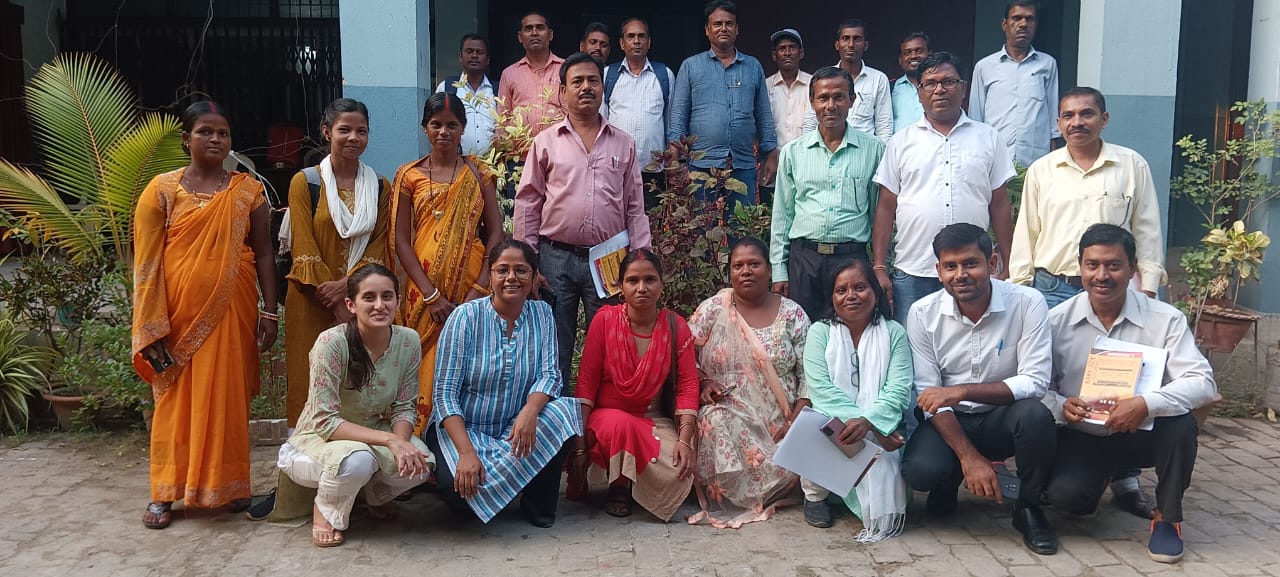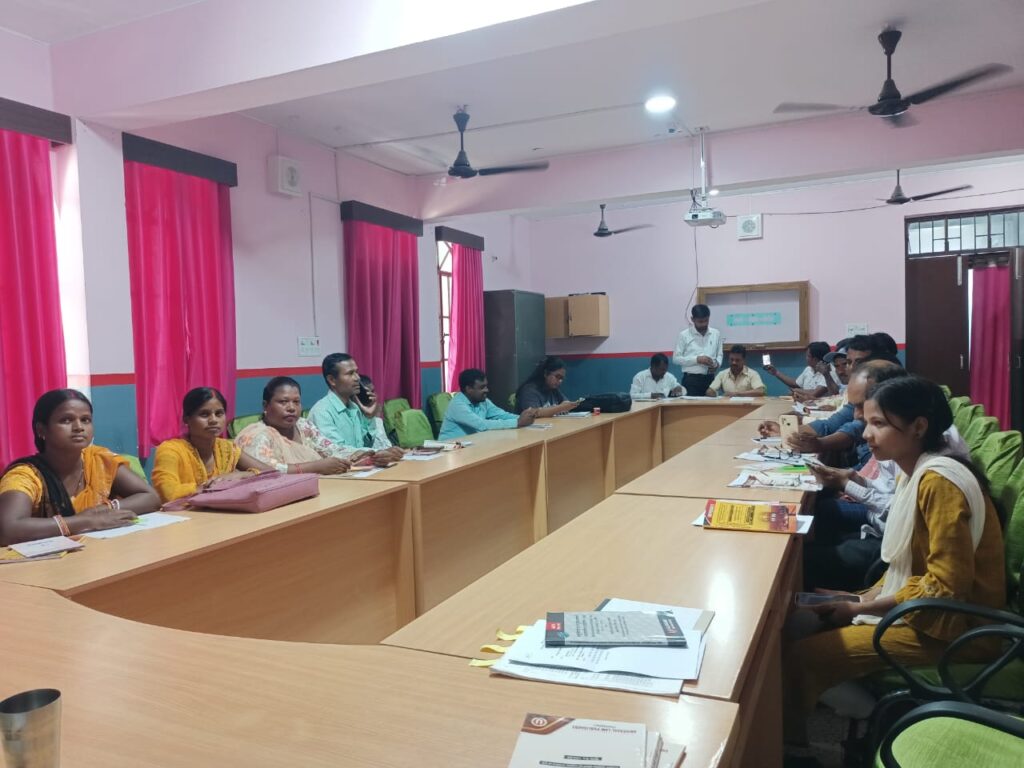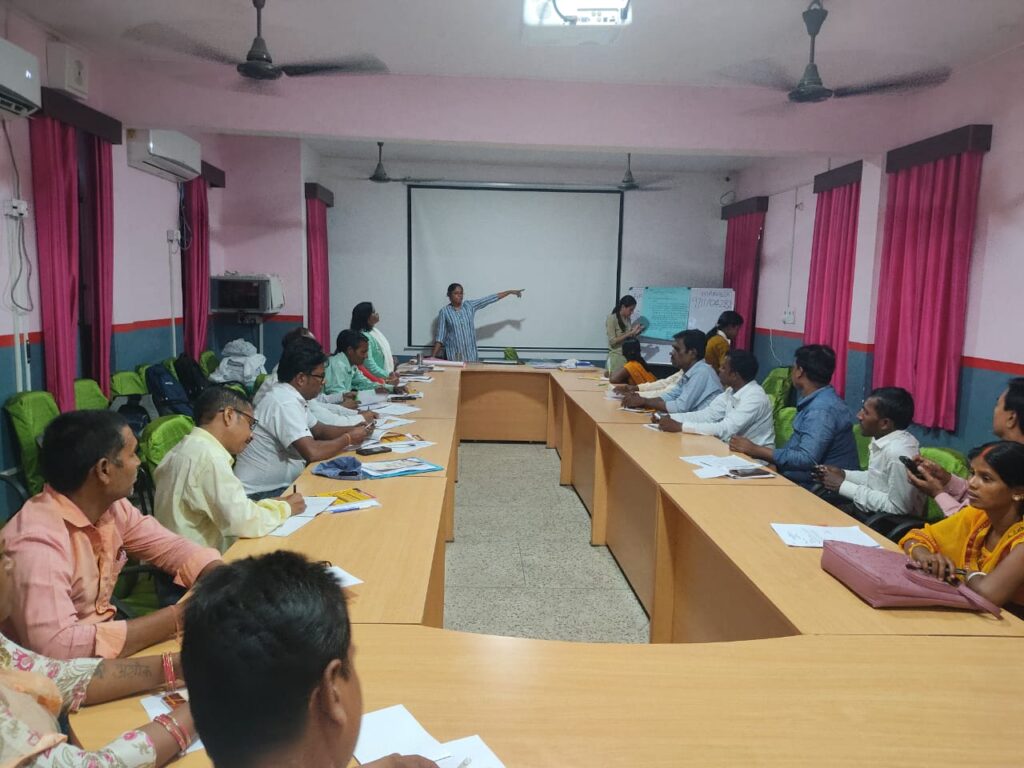
PART III conducted a training session with Vikas Mitras, who are panchayat-level “friends” recruited by the Bihar Government under the Bihar Mahadalit Vikas Mission. They are selected from the most literate and populous Mahadalit caste in the Panchayat and are envisaged as a crucial link in ensuring that the benefits of government programmes reach Mahadalit families. As such, they belong to the SC/ST community and work closely with the Bihar SC/ST Welfare Department. They are also engaged by the District Welfare Office to collect personal details, such as bank account information and Aadhaar numbers, to ensure that statutory compensation reaches complainant/survivor families in cases of caste atrocities. In one of the cases monitored by PART III, a Vikas Mitra suggested conducting training sessions for them on criminal procedures and the rights of survivors under special laws, such as the Scheduled Castes and Scheduled Tribes (Prevention of Atrocities) Act, 1989. This suggestion led to the organisation of the training session.
The first day saw participation from about 14 people. The session began with a round of introductions, where the Vikas Mitras shared insights about their work. They explained that they are recruited at the panchayat level. The Facilitators learned that Vikas Mitras are not only engaged in the last-mile delivery of government entitlements but also often act as first responders to caste atrocities in their respective panchayats. When an incident occurs, block- and district-level authorities immediately call on the Vikas Mitra for ground-level information.
The Vikas Mitras shared that when they visit the scene of an atrocity, take photos or videos, gather information, or attempt to assist complainants/survivors, they often become targets for the accused, who view them as threats. One Vikas Mitra remarked that he believed nearly 10% of Vikas Mitras had been killed for this reason and asked how they could better protect themselves. They also stated that they prepare most of the reports related to atrocity incidents but lack a proper understanding of the laws and procedures involved in such cases.
The Facilitators began the training with an overview of the Scheduled Castes and Scheduled Tribes (Prevention of Atrocities) Act, 1989. They explained the definition of “atrocity” under the law, including the requirement that the victim must belong to the Scheduled Caste/Tribe community and the accused must belong to a non-SC/ST community. However, one Vikas Mitra pointed out that this legal definition is not consistently followed, as he had frequently observed the police including sections of the SC/ST Act even when both parties belong to the SC/ST community. The group discussed that while this inconsistency might stem from a lack of police training or awareness, it could also be a deliberate tactic to extract bribes from the accused in exchange for omitting certain sections.
When one Vikas Mitra asked how a complainant could verify the sections included in an FIR, the Facilitators demonstrated using a copy of a fardbayan to identify the relevant sections. In Bihar, a handwritten complaint from the complainant is referred to as a fardbayan, and police officers often write the FIR number, crime section numbers, and date in the margins. However, this is not the official copy. To clarify, the Facilitators walked the participants through the official FIR format and explained the differences between the two. They also conducted a short tutorial on navigating the Bihar Police website to download FIRs.
The Facilitators emphasised the legal timelines for addressing cases, such as the 7-day deadline for providing compensation and the 60-day deadline for filing a charge sheet. However, most Vikas Mitras shared that these timelines are rarely adhered to. They noted that even getting an FIR registered often takes longer than 7 days, delaying compensation further.
During the session, the Facilitators outlined strategies to follow when the police refuse to register an FIR. These included:
- Visiting the police station with a written copy of the complaint and requesting an acknowledgment.
- If the police refuse to provide an acknowledgment, stepping out of the station, calling 112, and informing them about the refusal to register the FIR – this is done because a call at 112 is recorded and usually an SMS is received with a complaint number regarding the call;
- If the police continue to refuse, sending a handwritten complaint via registered post to the Station House Officer and the Superintendent of Police while retaining copies of the letter and acknowledgment for evidence. Emphasis was placed on letter-writing as a crucial method of documentation and evidence-building for later stages of a case.
- Finally, filing an application before the Magistrate to compel the police to register the FIR.
Similar strategies were shared for instances when the police fail to conduct a proper investigation. The Facilitators also advised that all letters be written in the complainant’s name to strengthen the case legally and protect the Vikas Mitras from potential harm.



In the post lunch session on day one, participants engaged in a hands-on activity using chits. Each chit represented a specific authority, and the Facilitators used these to explain the role of different authorities at various stages of a case under the Act. The session delved into critical aspects of criminal procedures, including initial stages like spot inspections, panchnama, and post-mortems. The importance of these documents and the details they must contain were discussed extensively. This activity also served to highlight monitoring mechanisms under the Act. Participants were provided with a table outlining the various reports mandated under the Act, their responsible authorities, and their higher-up officers in charge of reviewing the decisions.
The second day began with a recap of the first day to onboard nine new participants who joined. Each participant was given a copy of the bare Act and the contingency plan. The session progressed with a discussion on the procedure for compensation and Bihar’s contingency plan. Participants read aloud relevant provisions of the SC/ST Act and Rules, drawing connections between these laws and the contingency plan. They also analysed portions of the District Level Vigilance and Monitoring Committee’s minutes, identifying gaps in decisions and evaluating them against the law.
As the contingency plan mandates providing a copy of the charge sheet free of cost, the session emphasised the significance of a charge sheet. Participants were taught about the level of detail contained in a charge sheet and why it is vital for both the accused and the complainant to have access to it.
In the post lunch session of day 2, participants explored the stages of a criminal case in depth and were introduced to tools like the eCourts website for tracking case statuses.
To close the session, a practical letter-writing exercise was conducted. Participants watched a 10-minute clip from the movie Periyarum Perumal, B.A. B.L. and were asked to imagine that the victim in the scene had approached the Vikas Mitras for help. Divided into four groups, participants drafted letters based on different scenarios:
- A complaint about the incident because the police refused to register an FIR.
- A letter addressing the police’s inaction or failure to investigate.
- A complaint about threats received by Vikas Mitras.
- A letter highlighting delays in receiving compensation.
Each group read their drafts aloud, and the participants collectively provided feedback to refine the letters, identifying missing elements and suggesting improvements.
The session concluded with a vote of thanks to the participants, who provided valuable feedback. Many emphasised the need for such training to be conducted more regularly—ideally, once a month or at least once every three months.
